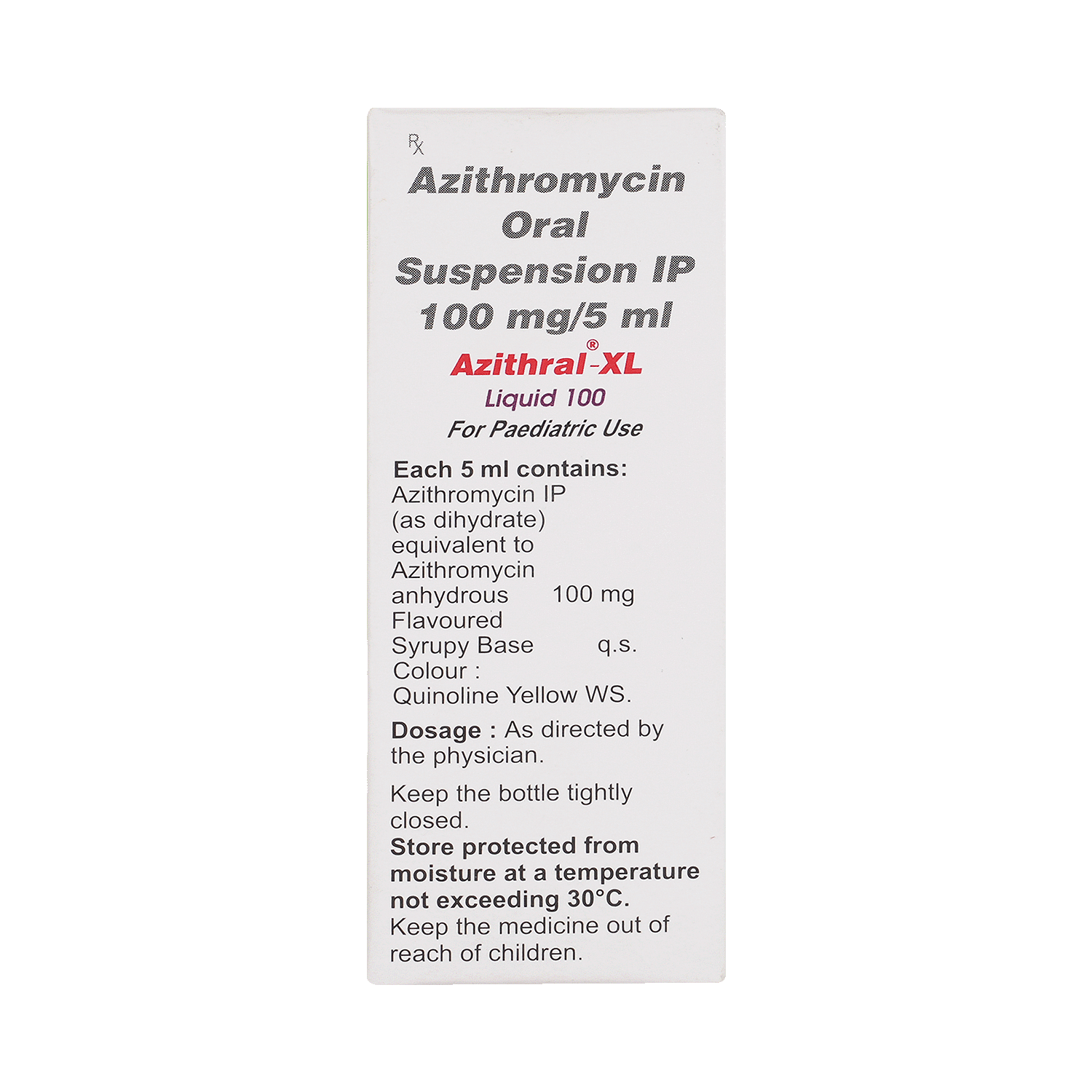
Azimid 100mg Oral Suspension
Manufacturer
Bioplasmid Healthcare
Salt Composition
Azithromycin (100mg/5ml)
Key Information
Short Description
Azimid 100mg Oral Suspension is an antibiotic medication used to treat a wide range of bacterial infections in children.
Dosage Form
Oral Suspension
Introduction
Azimid 100mg Oral Suspension is an antibiotic medication commonly given to children for the treatment of bacterial infections targeting the ear, eyes, nose, throat, lungs, skin, and gastrointestinal tract. It is essential to complete the entire course of this medicine to avoid the bacteria multiplying again or causing another infection.
Directions for Use
Give Azimid 100mg Oral Suspension with food to avoid an upset stomach. Encourage your child to drink plenty of water in case diarrhea develops as a side effect.
How it works
Azimid 100mg Oral Suspension is an antibiotic that works by interfering with the synthesis of essential proteins required by bacteria to perform important functions. It stops the infection-causing bacteria from growing further and prevents the infection from spreading.
Quick Tips
Complete the entire course of this medicine Give with food to avoid an upset stomach Encourage your child to drink plenty of water in case diarrhea develops Only give to your child for their current infection Stop the medicine and contact the doctor immediately if your child develops an itchy rash, facial swelling, and breathing difficulties soon after intake
Related Medicines

Azilide 100 RediMed Oral Suspension

Azee 100mg Liquid Peppermint & Orange

Azithral-XL 100 Liquid

Zitrac 100mg Oral Suspension

Azimcin 100mg Oral Suspension

Aziom Oral Suspension

Azipril 100 Oral Suspension

Pratham 100 Rediuse Oral Suspension

Azifed 100 Oral Suspension

Agthol 100mg Oral Suspension
Frequently asked questions
What if I give too much of Azimid 100mg Oral Suspension by mistake?
Azimid 100mg Oral Suspension is unlikely to cause harm if an extra dose is accidentally given. However, if you think you have given too much of the medicine to your child, it's crucial to contact a doctor immediately. Overdose may lead to unwanted side effects and potentially worsen your child’s condition.
Are there any possible serious side effects of Azimid 100mg Oral Suspension?
Some serious side effects that can occur with this medication include persistent vomiting, kidney damage, allergic reactions, diarrhea, and severe gastrointestinal infections. It's essential to consult your child’s doctor for guidance in these situations.
Can I give other medicines at the same time as Azimid 100mg Oral Suspension?
Azimid 100mg Oral Suspension can interact with other medications or substances. Before starting this medication, tell your doctor about all other medications your child is taking. Additionally, consult a doctor before giving any medicine to your child.
Can I get my child vaccinated while on treatment with Azimid 100mg Oral Suspension?
Antibiotics generally don’t interfere with vaccines or cause adverse reactions in children who have recently received them. However, a child should not be vaccinated until they are fully recovered from the illness. Once your child feels better, you can give them the vaccine.
Which lab tests should my child undergo while taking Azimid 100mg Oral Suspension on a long term basis?
The doctor may order kidney function and liver function tests periodically to monitor your child’s condition during long-term treatment with this medication.
Can Azimid 100mg Oral Suspension impact my child's digestion?
Children often experience digestive upset when taking medicines. Antibiotics can also affect the good bacteria in their gastrointestinal tract, potentially causing diarrhea. Azimid 100mg Oral Suspension may kill off both the bad and good bacteria in the gut, increasing your child's risk of other infections. If your child experiences diarrhea while on Azimid 100mg Oral Suspension, do not stop the medication course. Instead, contact your child’s doctor for further instructions.
Why is Azimid 100mg Oral Suspension given for 3 days?
The duration of treatment depends on the specific type of infection and the age of the patient. Azimid 100mg Oral Suspension isn’t necessarily given for three days. For bacterial infections, a single dose of 500 mg is administered for three days. Alternatively, it can be given as 500 mg once on day 1 and then 250 mg once from day 2 to day 5. In some cases of infections like genital ulcer disease, a single 1 gram dose is used. Therefore, you must strictly adhere to your doctor’s prescribed regimen.
What should I avoid while taking Azimid 100mg Oral Suspension?
It's generally recommended that patients using Azimid 100mg Oral Suspension avoid antacids with this medication, as this can impact its effectiveness. Additionally, it is advised to avoid prolonged exposure to sunlight or tanning beds because Azimid 100mg Oral Suspension increases the risk of sunburn.
Is Azimid 100mg Oral Suspension a strong antibiotic?
Azimid 100mg Oral Suspension is considered a broad-spectrum antibiotic. It works by targeting various bacteria in the body and has a long half-life, which contributes to its effectiveness with a single dose per day. It is important to follow your doctor’s instructions for dosage and duration of treatment.
Can I get a yeast infection from taking Azimid 100mg Oral Suspension?
Some people may develop a fungal or yeast infection, known as thrush, after taking Azimid 100mg Oral Suspension. Antibiotics like Azimid 100mg Oral Suspension can kill off the normal bacteria in your gut that normally prevents thrush. If you experience pain, itching, white patches in your mouth, or discharge, inform your doctor.


